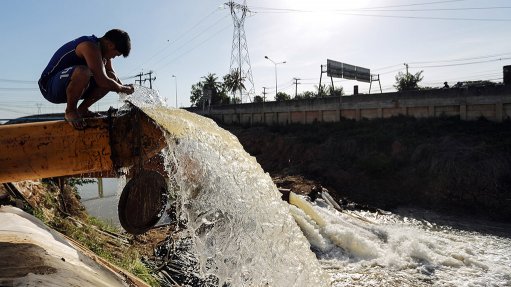
UMGENI WATER The provision of infrastructure, such as dams, is accompanied by certain risks to people who live close to this infrastructure
State-owned water entity Umgeni Water hosted an event in June at the Mhlabatshane dam, in KwaZulu-Natal’s Ugu district, to inform and educate attendees as part of a commitment to assist in the protection of communities that live close to bulk water storage and treatment infrastructure.
Umgeni Water abstracts, treats and supplies safe drinking water in bulk to six municipalities in KwaZulu-Natal, namely the eThekwini metropolitan municipality, the Msunduzi local municipality, the Ugu district municipality, the iLembe district municipality, the uMgungundlovu district municipality and the Harry Gwala district municipality.
“We are here with representatives from KwaZulu-Natal Aquatics and officials of the Ugu district municipality and Umzumbe local municipality who have joined us to share their knowledge and experience on how to prevent accidents, incidents and deaths in unprotected areas where people swim,” Umgeni Water CEO Cyril Vuyani Gamede said at the event.
Simulation exercises were undertaken to show people what should be done if a difficult situation arises while in a river or dam. Further, learners participated in various competitions to show what they had learnt from the demonstrations and whether the purpose of the event had been achieved.
Umgeni Water addressed the need for a reliable supply of safe drinking water through the construction of the Mhlabatshane bulk water supply scheme.
“It often happens that provision of infrastructure, such as dams, is accompanied by certain risks to people who live close to this infrastructure. Umgeni Water’s participation in this initiative is driven by its need to help save lives by minimising these risks. For many years, we have been concerned about the number of people who have drowned in rivers and dams,” Gamede outlined.
He expressed the hope that the objective of the event would form the basis for an ongoing undertaking.
“[What has been learnt through the] training, information and education . . . provided can be imparted by recipients to others in the community. In this way, many hundreds of people will become water wise and ambassadors for water safety,” Gamede said.
Highlighting another area of concern, he said, like many other State entities, Umgeni Water had infrastructure such as dams, pipelines, reservoirs and water treatment plants in its service area.
“If, for example, in the planning phase, a pipeline is to cross through a private-owned or State-owned property, Umgeni Water negotiates with the owner. If this negotiation is successful, it pays the owner compensation for the part of the property that will house the pipeline,” Gamede outlined.
He explained that the compensation payment in respect of the part of the property that would house the pipeline was called a servitude, registered in these instances in name of Umgeni Water.
In spite of clear markings on servitudes, informal dwellings have been built on them without consent. Gamede detailed that the construction of dwellings on or close to servitudes posed a huge problem.
“What follows is that Umgeni Water staff cannot access pipelines for maintenance and repair purposes and, if this cannot be done, a pipeline rupture could occur . . . These are high-pressure pipelines that carry huge volumes of water. Imagine this: a pipeline bursts and there are dwellings on or close to it. Everything in the path of the pipeline will be washed away.”
Recalling the rupture of a pipeline in Molweni in 2009, which transported water from the Nagle dam to Durban Heights, Gamede said a home that was built close by was washed away owing to the force of the water.
“Two children who were in the house were also swept away and were found dead the following morning. A school and some houses further away from the pipeline were also damaged. Umgeni Water is taking the issue of servitude encroachment very seriously and has begun a campaign by engaging mayors, ward councillors, amakhosi and schools to create awareness of the dangers of living on or near a pipeline and also of the consequences of infringement of the legal rights of owners of servitudes,” he concluded.